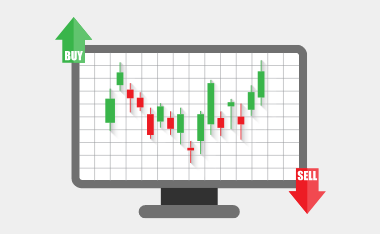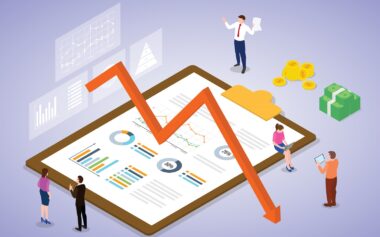Your Trading Education: How to Learn to Earn

Say you’re like the 90%+ of private traders who choose to trade share, options or forex using Technical Analysis…
The world of technical analysis is full of subtle differences from product to product and in all likelihood you will need assistance to understand how to read the charts and what those squiggly lines on a screen actually mean.
There are many thick books on technical indicators – covering all aspects of different indicators and trading techniques. Many of these books are written by theorists and some few are written by “gurus”.
Therein lies the challenge for most people, who aren’t theorists or gurus – the use of jargon and complex technical concepts that may be “interesting and exciting” to those people who eat sleep and breathe trading, but may not have any effect on whether you can use that to make money.
As an experienced trading coach, I have seen many new traders struggle to make a profit due to a lack of knowledge and understanding of the market.
In this article, I will discuss the importance of focusing on having a balanced education when starting to trade Forex and share some of the strategies that I have used to help my clients build sustainable, growing incomes.
Setting Realistic Achievable Progress Goals
It’s essential for new traders to set realistic goals when starting their Forex trading journey.
While it’s possible to make significant profits in Forex trading, it’s important to recognize that it’s not a get-rich-quick scheme.
Traders should focus on building a sustainable, growing income over the long term rather than trying to make a quick buck.
Goals provide a framework for progress and enable traders to track their performance over time.
By setting inspirational, motivational, specific, measurable, achievable, relevant, and time-bound (I’M SMART) goals, traders can identify areas of improvement, track their progress, and measure their success.
This process of goal-setting can help traders stay motivated and focused, even during periods of market volatility or uncertainty.
One important factor to consider when setting goals is the need to balance ambition with realism.
While it is essential to set challenging goals, they must also be achievable given the trader’s current skill level and market conditions.
Unrealistic goals can lead to frustration and disappointment, while achievable goals can provide a sense of accomplishment and momentum towards larger goals.
Another critical aspect of setting achievable goals is the ability to recognize achievements when they are reached.
By celebrating small successes along the way, traders can stay motivated and build confidence in their abilities.
This positive reinforcement can help traders maintain a positive mindset and approach challenges with a can-do attitude.
By developing a balanced education that includes risk management, market understanding, technical analysis, and trade analysis, traders can build a solid foundation for success.
And by setting achievable goals and recognizing their achievements along the way, traders can stay motivated and focused on the path to success.
Learn Before You Earn
Traders should adopt a “Learn Before You Earn” mentality and invest in their education.
Resources such as books, online courses, and trading forums can help traders gain knowledge and enhance their trading skills.
By having a thorough understanding of Forex trading, traders can develop a long-term perspective and build a sustainable, growing income.
Understanding the Forex Market
The first step in building a successful Forex trading career is to understand the market.
The Forex market is the largest financial market in the world, with an average daily turnover of over $5 trillion.
To be successful, traders need to have a basic understanding of how the market works, including the major currency pairs, market hours, and the factors that affect currency prices.
One of the most important factors that affect currency prices is the economic calendar. Economic data releases such as employment reports, inflation data, and GDP figures can have a significant impact on currency prices.
Traders need to stay up-to-date with the latest economic news and be able to interpret the data to make informed trading decisions.
Risk Management
Another critical aspect of Forex trading is risk management. New traders need to understand the importance of risk management and how to apply it to their trading strategies.
Risk management includes strategies such as stop-loss orders, position sizing, and portfolio diversification.
Traders should be willing to take calculated risks and manage them to minimize losses.
Technical Analysis
Technical analysis is an essential tool for Forex traders.
Technical analysis involves Analysing price charts and using indicators to identify trading opportunities.
Traders need to understand the different types of technical analysis, such as support and resistance levels, moving averages, and candlestick patterns.
By using technical analysis, traders can make informed trading decisions and improve their performance.
Analysing Past Trades
Analysing past trades is a critical aspect of developing a successful trading style.
By reviewing their trades, traders can identify patterns and trends in their decision-making process and evaluate the effectiveness of their strategies.
This process of self-reflection can provide invaluable insights into areas of strength and weakness, allowing traders to refine their approach and improve their profitability.
One important factor to consider when analysing past trades is the impact of emotions on decision-making. Emotions can significantly influence trading decisions, and it is essential to understand how they may be affecting trading performance.
By reviewing past trades and identifying situations where emotions may have played a role, traders can develop techniques to manage their emotions effectively and make more objective decisions in the future.
Another critical aspect of analysing past trades is the ability to identify opportunities for improvement.
Traders should examine each trade to identify what worked well and what could have been done differently.
By identifying areas of weakness, traders can take steps to improve their strategies and decision-making process.
This can include adjusting risk management techniques, refining entry and exit points, or experimenting with new trading strategies.
By continually refining their approach, traders can develop a winning trading style that maximizes their profits while minimizing their risks.
Growing as a Trader
Just like any other profession, the road to success in trading starts with education.
In order to become a profitable trader, it is crucial to have a deep understanding of the markets, trading strategies, risk management techniques, and trading psychology.
With a solid foundation of knowledge and skills, traders can make informed decisions, identify opportunities in the markets, and effectively manage their risks.
However, education is not a one-time event but rather an ongoing process.
As traders gain more experience, they may encounter new challenges and opportunities that require further learning and skill development.
Therefore, successful traders never stop learning and are continuously improving their skills to stay ahead of the curve.
As traders develop their skills and experience, their income potential also increases.
A successful trader can earn a substantial income through trading, but it takes time, dedication, and hard work to get there.
By continually learning and honing their craft, traders can increase their profitability, expand their trading strategies, and develop new techniques to adapt to changing market conditions.
Trading can be a lucrative profession, but it requires a commitment to education and continuous improvement.
Developing Your Trading Plan
Traders should develop a trading plan that outlines their rules and guidelines for trading decisions.
Developing a growth-focused trading plan is crucial for traders looking to build a sustainable and consistent profit.
Yes, your trading plan should include step by step easy to follow processes on locating strong trade entry and exit points, how to grow your position sustainably, and how to manage risk to minimise individual losses and maximise overall profits.
But a comprehensive trading plan should not only focus on the technical and strategic aspects of a trader’s method but also incorporate a growth-focused approach that enables traders to adapt and grow with changing market conditions.
This approach should focus on continuous learning, risk management, and sustainable growth to ensure long-term success.
By having a trading plan, traders can avoid unproductive emotional decision-making and improve their performance over time.
Conclusion
In conclusion, an ongoing balanced education that gives you a strong foundation and helps guide you as your skills as a forex day trader develop is crucial for successful Forex trading.
Successful, Profitable Traders need to have a thorough understanding of the Forex market, risk management, technical analysis, analysing past trades, setting realistic goals, and developing a trading plan.
With the right education, mindset, and strategies, virtually anyone can become a successful Forex trader.
More Information
For more trading term general definitions, visit our A to Z of Forex Trading
To look at these concepts in action, please visit our sister site, Latest Forex Rates
What to do Next
If you have more questions or need further guidance, don’t hesitate to reach out to us at The Trading Coach International for personalized coaching and support.
If you would like to learn more about trading forex profitably and what steps you can take next to get on the right track to build your Lifestyle Income From Trading, you can book an no obligation, Free Strategy Call with our Lead Trading Coach by clicking on THIS LINK
Disclaimer
The information, strategies, techniques and approaches discussed in this article are for general information purposes only. The Trading Coach International does not necessarily use, promote nor recommend any strategies discussed in this article. The information in this article may not be suitable for your personal financial circumstances and you should seek independent qualified financial advice before implementing any financial strategy. The Trading Coach International is not a financial advisor and does not have AFS registration.




















